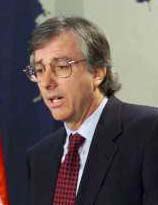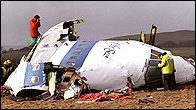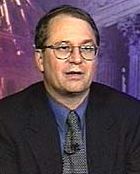 |
A monthly publication of the United States Committee for a Free Lebanon |
 |
A monthly publication of the United States Committee for a Free Lebanon |
| Vol. 1 No. 1 | January 1999 |
|
Lebanon Report Middle East Report |
|
MEIB Main Page Executive Director Ziad K. Abdelnour Editor Gary C. Gambill Advisory Board Rachel Ehrenfeld Gil Feiler Murray Kahl Daniel Nassif Daniel Pipes Gary P. Ratner David P. Steinman |
Since his ascension to the Lebanese Presidency, Emile Lahoud has completely reorganized the military security apparatus of the country, appointing well-known allies of the Syrian government to important state security positions. According to most observers, power is slowly shifting from the warlords in the previous government to the heads of security and intelligence services.
Power is slowly shifting from the warlords in the previous government to the heads of security and intelligence services |
"The current government resembles that of Damascus. Most of its members are directly linked to the head of the regime, and are insignificant to the people," says one source. "Real power now has shifted to the general directors, executive heads of the Mukhabarat (military intelligence), state security agency, and the general security agency. Those men who have power in these agencies, have power in Lebanon. And those men, appointed by Lahoud recently, are Syria's men. Now Lebanon is like Syria, it is a security component of Syria's security power."
The implications of these appointments are very clear: Important security files and archives which had previously been withheld from direct Syrian inspection are now being exhaustively studied by the staff of Syria's chief intelligence officer in Lebanon, Brigadier General Ghazi Kanaan. There is widespread apprehension in Lebanon about the consequences of this disturbing development.
Lebanese and Syrian officials have rejected a four-point plan offered by Japanese
Foreign Minister Masashiko Komura earlier this month to bring about an Israeli withdrawal
from south Lebanon.
Komura presented the plan to leaders of six Arab countries during his extended tour of the
Middle East from January 5 to 13. The main points in the plan:
The Komura plan met with strong Israeli approval. Israeli foreign minister
Ariel Sharon said he was"very impressed by the Japanese proposal regarding a solution
for Lebanon," after meeting with the Japanese envoy. However, Syrian officials
strongly opposed the third point calling for negotiations between Israel and Lebanon.
"I am afraid I can't say that the situation is optimistic," said Komura after
discussions with Syrian President Hafez al-Asad.
Not surprisingly, Lebanese Prime Minister Salim al-Hoss followed the Syrian lead and
rejected the proposal, saying that his government is "not prepared for any talks or
negotiations nor security arrangements with Israel."
According to sources in Lebanon, the departure of Rafik Hariri as prime minister of Lebanon just days after Gen. Emile Lahoud was "elected" president was due partly to the so-called "Nohad al-Mashnouk affair." In October, the Syrians learned that al-Mashnouk, one of Hariri's leading advisers, had been working closely Col. Jibril Rajoub, head of the Preventive Security service for Arafat's Palestinian Authority (PA).
The connection was uncovered during a recent session of the UN General Assembly, when Syrian foreign minister Farouq al-Shara met with Hariri and Mashnouk in the Syrian delegation's office in New York to coordinate the speeches that Lebanese and Syrian representatives were scheduled to give before the plenary session. The Syrians later alleged that Mashnouk had revealing what had been said to the Palestinians, who apparently tipped off Israeli prime minister Benjamin Netanyahu, enabling him
to modify his own speech at the last minute to refute Syrian and Lebanese claims.
Upon his return to Beirut, Mashnouk came under strong Syrian pressure and Hariri reportedly advised him to leave the country for Egypt. After boarding an aircraft bound for Cairo at Beirut airport, he was arrested by plain-clothes Lebanon intelligence agents (apparently at the behest of the Syrians). Hariri intervened to secure his release and Mashnouk was able to leave the following day under the protection of Hariri's personal bodyguards. He now resides in Paris with his family.
Mashnouk was born into a Sunni family in Beirut in 1950. During the early 1980's, he worked as a journalist for the left-wing daily As-Safir which at that time was financed by Libya and the PLO. Due to his close links with the PLO, he was forced to leave Beirut after the Israeli invasion. Mashnouk began working for Hariri in 1992, in charge of overseeing Lebanese media that Hariri secretly financed. Over the years, he apparently kept Arafat to abreast of the Syrian
position regarding the peace process and Hezbollah.
 |
| Dennis Ross |
After parting ways with billionaire prime minister Rafiq Hariri, Lebanon
is now trying to depart from his high-gloss, high-debt strategy for repairing the nation's
economy following its 17-year civil war.
So far, the central bank has had little trouble keeping the Lebanese pound steady against
the dollar. Still, investors for the moment aren't showing much interest in long-term
debt, according to a local Lebanese investment banker, and if the government falters in
its economic program this year, "anything goes," because there is enough debt
denominated in Lebanese pounds to wipe out the central bank's reserves if converted to
dollars.
"Lebanon could not get back to where it was 15 years ago, even if there was
peace" with Israel, because other Arab capitals have raced ahead, says George Corm,
an economics professor turned finance minister, as a jackhammer buzzes outside his window
in Beirut's new downtown, with its recently opened pedestrian walkways and antique shops.
"The fact that you can get from here to the airport in five or six minutes is great,
but we need to look at the productive sector, the real economy. Now we're stuck with a lot
of luxury buildings that are unsellable," a legacy of the Hariri era building boom.
Lebanon is also stuck with a huge pile of bills from the outgoing Hariri government that
"should have been paid" last month, Dr. Corm says. He says the bills, for
medical disbursements and the like, total around $400 million. That, plus pre-approved pay
raises, could add as much as $1 billion to this year's spending -- $300 for every Lebanese
citizen.
Those extra outlays will come on top of a huge structural deficit in the state's finances.
Lebanon finances its growing debt at 15% interest. Because the returns are so good for the
institutions that hold the country's debt, it isn't surprising that Lebanese banks do very
little industrial lending.
Despite all the huge public relations campaign undertaken by Solidere,
Lebanon's biggest company during the Hariri era, the real estate publicly traded entity
showed a substantial drop in profits during 1998.
The latest report of a Beirut based brokerage firm , issued early this month, showed that
Solidere, which is rebuilding the center of the capital devastated during the 1975-90
civil war, made around $66 million in net income last year compared to $78 million in
1997.
The firm said cancellation of real estate contracts resulted in Solidere falling short of
a widely circulated $81 million forecast."They were relying on some contracts with
the government that did not come through because of the austerity policy and need to
control the budget deficit," said Nabil Aoun, President of Fidus.
Solidere executives could not be reached for comment. On the Beirut bourse A shares
(SOLA.BY) closed down $0.12 at $10.50 and B shares(SOLB.BY) rose the same amount to
$11.00. In London, the Solidere GDR (SOLAq.L) was up $.20 in afternoon trade. Solidere
results released in November showed that net income in the first six months of 1998 fell
to $2.02 million from $12.4 million in the corresponding period the year before.
In an interview with Reuters news agency last month, the father of one of the 270 victims who perished in the December 1988 explosion of Pan Am flight 103 over Lockerbie, Scotland expressed suspicion that Iran and Syria played the primary role in orchestrating the bombing.
 |
| The crash site on December 22, 1988 (AP) |
Jim Swire has assiduously monitored developments in the case since the death of his
24-year-old daughter Flora ten years ago, and recently met with British Prime Minister
Tony Blair to discuss what he believes to be "serious difficulties" with the
Lockerbie investigation. Among these, Swire cites the testimony of former Iranian
intelligence agent Abolghasem Meshabi. Meshabi told German investigators in 1997 that the
bomb was brought in by an Iranian aircraft and transferred to the Pan Am plane at Heathrow
airport. Swire said that Iran also had a strong motive for the bombing. Six months prior
to the Lockerbie bombing, an American warship, the USS Vincennes, accidentally shot shot
down an Iranian airliner over the Persian Gulf. "Libya [also] had a motive."
said Swire, "but Iran's motive was fresher and stronger."
Until 1991, when investigators singled out Libya as the sole perpetrator of the bombing,
Iranian and Syrian involvement in the tragedy was widely assumed in the Western media .1 Swire
suggests this sudden change may have occurred as a result of Syria's participation in the
1991 Gulf War and and Iran's decision to remain neutral during the conflict. He noted that
the remaining American hostages held by Iranian and Syrian-backed guerrillas in Lebanon
were released within weeks of the 1991 indictments. "The question is, was there a
deal done between the United States and Iran?"
1 On November 5, 1989, The Sunday Times published a
lengthy report on the Lockerbie bombing naming seven members of the Syrian-aligned Popular
Front for the Liberation of Palestine--General Command (PFLP-GC) as prime suspects in the
investigation by Scottish police.
The regime of Saddam Hussein is rapidly seeking to develop nuclear weapons and could be months away from completing one unless inspectors are allowed free access in Iraq, a former U.N. inspector said.
 |
| David Albright |
In perhaps the most stunning shift in Arab world relations with Iraq since the
1990-1991 Gulf War, Saudi Arabia and Egypt began to explicitly call for the ouster of
Iraqi President Saddam Hussein earlier this month. This new stance appears to have been a
reaction to a speech by Saddam encouraging Arabs to rise up against rulers "who boast
of friendship with the United States."
In an interview with The Berliner Kurier newspaper, Egyptian Foreign Minister Amr
Moussa said that the Iraqi leader is "shaming the entire Arab region through his
politics" and called for the Iraqi people to revolt against him.
On January 7, Riyadh Al-Riyadh, the leading newspaper in Saudi Arabia published a
scathing editorial which stated:
"The eternal remedy for Iraq is the removal of Saddam and this is an undisputed fact. How can this be achieved? The matter will be determined in the race against time between the ruler and his subjects--the Iraqi people alone hold the key to the future and must act accordingly."
Secretary of State Madeleine Albright is scheduled to travel to Egypt and
Saudi Arabia on January 28 to assess this policy shift. It appears. though, that other
Arab states have already begun to gravitate towards the new Egyptian/Saudi policy of
confronting Saddam. On January 24, the Arab League issued a statement calling upon Iraq to
refrain from "provocative actions" against its neighbors and comply with UN
resolutions.
The new "anti-Saddam" consensus in the Arab world has important implications for
American policy. Last month, Congress passed the Iraq Liberation Act, which allocated $97
million worth of surplus military equipment to seven Iraqi opposition groups. Analysts say
that the new attitude toward Saddam could generate support in the region for creating an
armed force of Iraqi exiles in countries adjacent to Iraq--a prospect that seemed
unthinkable only a month ago.
An official panel that investigated the U.S. embassy bombings in Africa
reports that a "collective failure" by successive administrations and Congress
over the years has left American diplomatic missions abroad extremely vulnerable to
terrorist threats. The panel, known as the Accountability Review Board, also accused the
State Department and other agencies of giving low priority to embassy security.
The board was convened after the nearly simultaneous bombings at U.S. embassies in Kenya
and Tanzania last August. Twelve Americans were among the 224 people killed in the
bombings. The panel was directed by retired Adm. William Crowe, a former chairman of the
Joint Chiefs of Staff.
The report found no evidence that any employee of the U.S. government, including the armed
services, failed to fulfill his or her duty. "However," the report said,
"we believe there was a collective failure by several administrations and congresses
over the past decades to invest adequate efforts and resources to reduce vulnerability of
diplomatic missions around the world to terrorist attack."
CBS News, which broke the story, said the report depicts a mindset in which senior
officials were more concerned about budgets than lives. Crowe gave an account of the
report to reporters at the State Department. The report said responsibility for the
security failures must be shared broadly, including by the secretary of state. Secretary
of State Madeleine Albright, also appearing before reporters, accepted that
responsibility. "It reminds us all that no matter how much we care, no matter how
much we do, we can always do more when the lives of our people are on the line," she
said.
Crowe said the board recommended a sustained investment of $1.5 billion per year over the
next decade to upgrade security at embassies. "A quick fix is out of the
question," Crowe said. "We're going to have a lot of embassies in harm's way for
a long time."
The study said the government relies too heavily on prior warnings of terrorist attacks
instead of assuming that the most vulnerable targets are most likely to be struck. To
improve security in the future, the administration will have to provide "adequate and
sustained" funding for diplomatic missions.
After the August bombings, the State Department surveyed all 260 diplomatic posts abroad
and found that only 40 were fully secure. Congress since has provided funds to upgrade
security at the unsafe posts. Twelve people have been indicted in the two bombings,
believed to have been masterminded by Osama bin Laden, a Saudi who is said be living in
Afghanistan.
The two East African bombings occurred within minutes of each other on Aug. 7. Eleven
people were killed at the U.S. Embassy in Dar es Salaam. A much more deadly explosion
outside the U.S. Embassy in Nairobi killed 213 people and injured more than 5,000. U.S.
forces retaliated 13 days later, launching cruise missile strikes against alleged
terrorist camps in Afghanistan and a chemical plant in Sudan.
Israeli radio has said that the United States' Central Intelligence Agency
has intensified its activities in the Palestinian self-rule area and opened offices for
itself in Gaza, Hebron and Nablus.
Israeli radio added that the CIA also intends to open representative offices in all the
cities of the West Bank and the Gaza Strip. The radio continued that the CIA informed the
Palestinian government of its intention to employ Palestinians among those who speak both
Arabic and English. Palestinian security officials were reportedly fearful of such
expanded activities in the self-rule areas.
The CIA played a key role in the negotiations between Israel and the Palestinian
government and took part in reaching an Israeli - Palestinian security agreement which
ensures the US role as "supervisor and mediator."
The Wye River accord provides for a role to be played by the CIA in implementing the
agreement, especially in investigating members of Palestinian terrorist groups opposed to
the Peace Process.
Senior U.S. counter-terrorism officials have learned that Saudi dissident Osama bin
Laden relies upon computer technology to communicate with members of his Al Qaeda terror
network around the world in planning attacks.
The primary means of communications is relatively low-tech: the floppy disk. Couriers
carry disks containing his orders out of Afghanistan to couriers in other countries where
his terrorist cells are located.
 |
| Osama bin Laden |
"It takes them time to get their stuff together as a result," said one
official. Recently, however, the physical transfer of such information has grown
increasingly difficult due to the close scrutiny of his network by American intelligence
and his supporters have begun using email and fax technology.
According to US counterterrorism officials, the Al Qaeda terror network now operates in 50
countries with training camps in 20 nations. It is believed that Saudi expatriate Khaled
Al Fawwaz may be the principal courier for transmitting information to Al Qaeda members
inside the U.S. The Advice and Reformation Committee (ARC), a London-based organization
headed by Al Fawwaz, has sent a number of faxes to 10 US cities containing Bin Laden's
orders to murder American citizens.
The FBI's international terrorism division has sought to monitor the communications of the
Al Qaeda terror network since January 1995, when Philippine police arrested Al Qaeda
member Ramzi Youssef in connection with a plan attempt to bomb the motorcade of Pope John
Paul II during his visit to Manila. Officials say that Youssef's laptop computer contained
detailed plans for bombing 11 US airliners over the Pacific and a plot to kill President
Clinton during his 1996 visit to the Philippines.
In effort to step up the pressure, the U.S. recently issued wanted posters in several
languages which offer a $5 million reward for information leading to Bin Laden's arrest.
The posters, which will be distributed to all US diplomatic missions abroad, offer
"absolute confidentiality" and possible relocation for informers. "This
reward offer has already generated leads that are being investigated," said State
Department spokesman James Rubin. "We will vigorously advertise this offer around the
world. We will advertise it on the Internet, where we can reach over 100 million
subscribers," he added.